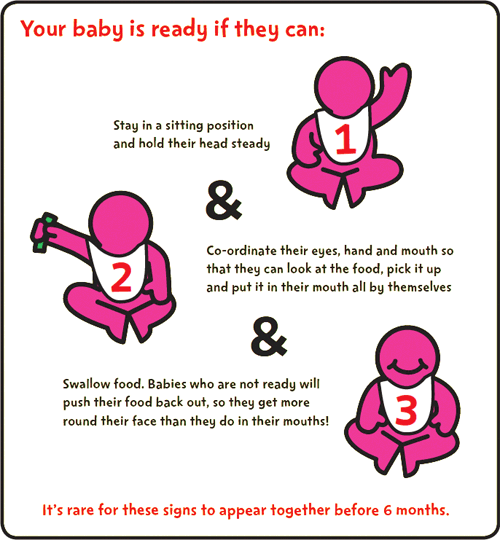Home > Weaning
Weaning
Weaning onto solids
Your breast milk is the perfect first food. The Department of Health recommends that you wait until your baby is around 6 months of age before giving any other food or drink.
Starting your baby on solid foods
Introducing your baby to solid foods, often called weaning onto foods, should start when your baby is around 6 months old.
It’s a really important step in your baby’s development and it can be great fun to explore new flavours and textures together.
To begin with, how much your baby takes is less important than getting them used to the idea of eating. They will still be getting most of their nutrition from milk. Babies don’t need three meals a day to start with, so you can start by offering foods at a time that suits you both.
Gradually, you’ll be able to increase the amount and variety of food your baby eats until they can eventually eat the same as the rest of the family, in smaller portions. Have a look at the First Steps Nutrition Trust website for practical advice and information.
No rush to mush
Starting at around 6 months
The latest research reviewed by the World Health Organization shows that babies need nothing but mum’s milk or infant formula for the first 6 months of life. This gives a baby’s digestive system time to develop so that they cope fully with
solid foods. This includes solid food made into purees and cereals added to milk.
Why it pays to wait until they’re ready
If you are breastfeeding, feeding only mum’s milk up to around 6 months will give them extra protection against infection, and it will continue to protect them for as long as you carry on.
Whether your baby has mum’s milk or infant formula, waiting till your baby is ready for food will save a lot of time too, as they will quickly be able to feed themselves and with less mess, as they’ll be able to swallow properly.
First foods
From around 6 months your baby’s first foods can include soft cooked vegetables like parsnip, potato, yam, sweet potato or carrot. Soft fresh fruit like banana, avocado, peach or melon are good too. Babies often like to start eating these by having them as finger foods, or mashed. You can also spoon-feed your baby, although they will soon be able to do it for themselves.
Keep feeding mum’s milk or infant formula as well, but don’t give cow’s milk as a drink until they are 1 year old.
Finger foods
Finger food is food that’s cut up into pieces big enough for your baby to hold in their fist and stick out of the top of it – pieces about the size of your own finger work well. Your baby learns to chew this way.
For more information on weaning and practical advice on introducing solid food to babies, have a look at the First Steps Nutrition Trust website.
3 signs your baby is ready for their first food
Every baby is an individual, but there are 3 clear signs which, together, show your baby is ready for these types of first solid foods alongside mum’s milk or infant formula.
Some signs mistaken for a baby being ready for solid foods
• Chewing fists
• Waking in the night when they have previously slept through
• Wanting extra milk feeds
These are normal baby behaviours and not necessarily a sign of hunger, nor being ready to start solid food. Starting solid foods will not make them any more likely to sleep through. Sometimes a little extra milk will help until they are ready for food.
True or false?
Babies who are big for their age need solid foods earlier than other babies.
False. It’s easy to see why people might think that. But remember, it’s what’s going on inside that counts. Babies are ready for solid foods when their digestive systems are developed enough to cope – and this is usually at around 6 months.
But every baby is an individual so if you think yours is ready, speak to a member of your health visiting team.
